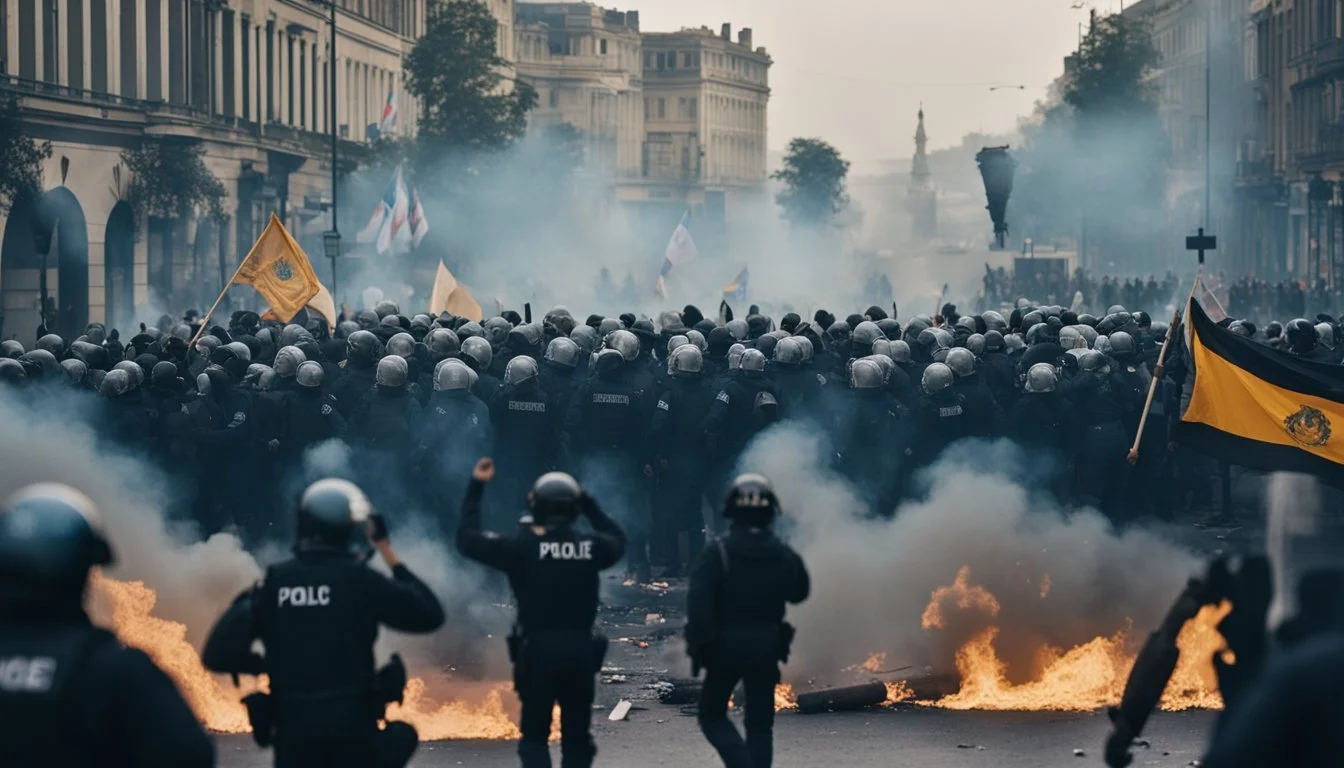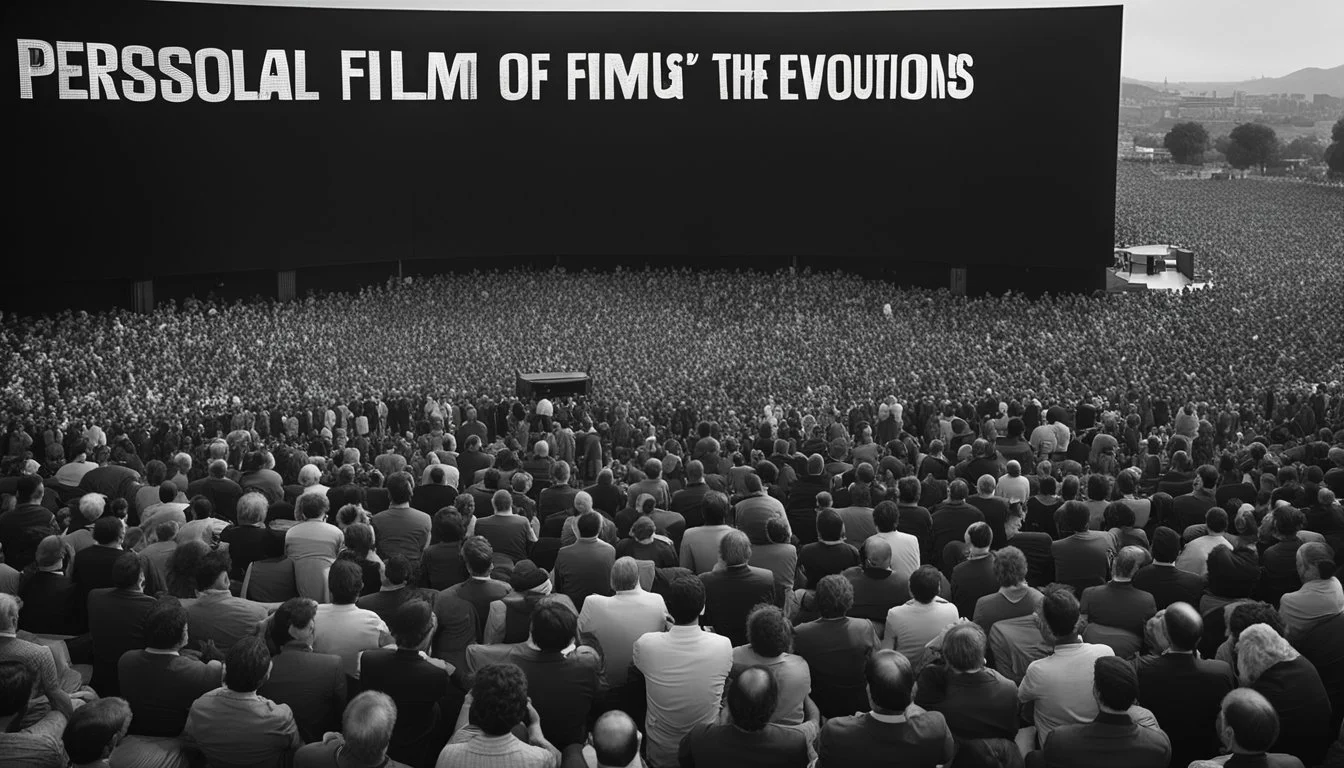7 Must-See Films on Political Revolutions
Essential Viewing for History Enthusiasts
Political revolutions have long been a subject of fascination in cinema, offering viewers a deep dive into the complexities and raw emotions tied to societal upheaval. These films transport audiences to pivotal moments in history, where courage, resilience, and the quest for justice shape destinies.
Exploring these cinematic treasures provides not only entertainment but also valuable insights into the power dynamics and human stories behind major political movements. Whether through the lens of a well-documented historical event or a more nuanced personal narrative, these films stand as time capsules, capturing the essence of struggles that have defined eras.
1) La Battaglia di Algeri (1966)
"La Battaglia di Algeri," also known as "The Battle of Algiers," is a critically acclaimed film directed by Gillo Pontecorvo. The film depicts the Algerian War (1954-1962), focusing on the intense conflicts between Algerian insurgents and the French government.
Shot in a documentary style, the film provides a stark and gripping portrayal of the struggle for Algerian independence. The narrative includes harrowing scenes of violence from both sides, showing children shooting soldiers and women planting bombs.
The use of non-professional actors adds a layer of authenticity to the movie. The film's stark realism and its portrayal of guerrilla warfare tactics and state responses have made it a subject of study in political science and military academies.
Cinematically, it stands out for its powerful storytelling and innovative technique. The impact of "La Battaglia di Algeri" extends beyond cinema, influencing numerous films and discussions on colonialism and resistance movements.
For more information, visit IMDb or Wikipedia.
2) V for Vendetta (2005)
"V for Vendetta" is a dystopian political action film directed by James McTeigue.
The film is set in a future where the UK is under the control of a fascist totalitarian regime.
The main character, V, a masked vigilante portrayed by Hugo Weaving, becomes the face of resistance against this oppressive government.
Natalie Portman plays Evey Hammond, a young woman who becomes entangled in V's revolutionary plans.
The plot thickens as V uses a series of calculated attacks to challenge the government's authority, symbolizing a fight for freedom and justice.
The storyline explores themes of individual liberty, government oppression, and the power of ideas.
"V for Vendetta" is based on the graphic novel series by Alan Moore and David Lloyd, making it an adaptation that's both visually striking and thought-provoking.
The phrase "Remember, remember the Fifth of November" echoes throughout the film, reinforcing the importance of remembering historical revolutions.
This film has garnered praise for its bold political messages and engaging narrative. It remains a relevant commentary on government power and civil liberties.
3) Reds (1981)
Reds is a historical drama directed by Warren Beatty. The film focuses on the life of John Reed, a North American journalist. Reed traveled to Russia to document the October Revolution, resulting in his book "Ten Days That Shook the World."
Beatty stars as Reed and Diane Keaton plays Louise Bryant. Jack Nicholson appears as playwright Eugene O'Neill.
The film is noted for its detailed portrayal of revolutionary politics. It explores Reed's passion for communism and his involvement in the 1917 Communist Revolution.
Reds also includes a personal narrative. It highlights the relationship between Reed and Bryant, showcasing their ideological commitments and personal struggles.
This film combines a historical narrative with personal accounts, offering a multidimensional view of the era. It illustrates the broader political movements and individual sacrifices of the time.
For more information, visit the IMDB page.
4) The Motorcycle Diaries (2004)
The Motorcycle Diaries is a biographical film that chronicles the journey of a young Ernesto "Che" Guevara and his friend, Alberto Granado, across South America.
Starting on motorcycles, their journey begins in Argentina and takes them through diverse landscapes and cultures, ending in Peru. The trip exposes them to significant social and economic issues, shaping Guevara's political consciousness.
The film, directed by Walter Salles, is based on Guevara's own memoir. It captures the early stirrings of Guevara's revolutionary spirit, later leading him to become a key figure in the Cuban Revolution.
Critics have praised the film for its evocative depiction of South America's beauty and challenges. The transition from adventure to political awakening makes it an engaging watch for those interested in historical and political narratives.
For more information on the film, visit the Wikipedia page or the IMDB listing.
5) Les Misérables (2012)
Les Misérables, directed by Tom Hooper, presents a dramatization of Victor Hugo's classic novel. The story is set during the June Rebellion of 1832, a lesser-known uprising in France, not the more famous French Revolution of 1789.
The film features a stellar cast, including Hugh Jackman, Russell Crowe, and Anne Hathaway. Their performances, along with the musical score, bring emotional depth to the historical context.
Although primarily known for its musical elements, Les Misérables keeps a strong focus on the political and social upheaval of the period. The characters' struggles showcase broader themes of justice, freedom, and human rights.
The film won multiple awards and became a commercial success, grossing over $100 million. Despite some criticism for its pacing and adaptation choices, it stands out as a powerful representation of political rebellion through personal narratives.
For further details, see Les Misérables on IMDb.
6) The Wind That Shakes the Barley (2006)
"The Wind That Shakes the Barley," directed by Ken Loach, is a gripping Irish war drama set during the Irish War of Independence (1919-1921) and the Irish Civil War (1922-1923). The film vividly portrays the tumultuous period through the eyes of two brothers, Damien and Teddy O'Donovan.
Damien, played by Cillian Murphy, and Teddy, played by Pádraic Delaney, join the Irish Republican Army to fight against British rule. Their journey is marked by personal and political conflicts, illustrating the complexities of loyalty, sacrifice, and the impact of war on personal relationships.
The film stands out for its realistic depiction of guerrilla warfare and the harsh realities of the time. With strong performances and a compelling script by Paul Laverty, the movie provides an insightful look into Ireland's struggle for independence.
For more information on "The Wind That Shakes the Barley," visit IMDb.
7) Persepolis (2007)
Persepolis, directed by Marjane Satrapi and Vincent Paronnaud, is an adult animated biographical drama film. The story is based on Satrapi's autobiographical graphic novel. It traces the life of a young girl growing up during the Iranian Revolution.
Set against the backdrop of political upheaval, the film presents a vivid portrayal of life in Iran. Through stark black-and-white animation, it highlights the contrast between life before and after the revolution.
The protagonist, Marji, navigates her childhood with curiosity and resilience. Her personal journey reflects the broader political changes in the country. The film’s animation style accentuates the emotional and political themes effectively.
Simultaneously personal and political, Persepolis explores themes of identity and cultural heritage. Satrapi’s narrative illustrates the struggle to maintain individuality in repressive regimes, making it a compelling film about political revolution and personal growth.
For more information, see Persepolis on Wikipedia.
Historical Context of Political Revolutions
Political revolutions have significantly influenced the course of history, shaping societies and governance structures. Critical analysis of revolutions reveals pivotal moments and the influential leaders who have driven these profound changes.
The Role of Revolutions in Shaping History
Revolutions have often marked turning points in history, with the French Revolution of 1789 as a prime example. This revolution dismantled the monarchy, paving the way for modern democratic governance. Similarly, the American Revolution established the United States as an independent nation, setting a precedence for colonial liberation.
Industrial Revolutions also prompted political changes, as seen in the labor movements that led to improved labor laws. Political upheavals in the 20th century, such as Russia’s Bolshevik Revolution in 1917, radically transformed global ideologies and influenced the Cold War dynamics.
Key Leaders and Figures
Revolutionary movements often hinge on charismatic leaders. Figures like George Washington and Thomas Jefferson were instrumental in the American Revolution, advocating for independence and democracy. In France, Maximilien Robespierre became a key figure during the Reign of Terror, symbolizing the radical phase of the French Revolution.
In Russia, Vladimir Lenin shaped the Bolshevik Revolution with his Marxist theories. Che Guevara and Fidel Castro became global symbols of resistance and revolutionary change through their roles in the Cuban Revolution. Each leader's ideological vision and tactical strategies were central to their movements' successes and failures.
Themes and Symbolism in Revolution Films
Revolution films often explore deep themes and symbolism to convey messages about freedom, sacrifice, and the human spirit. These elements underscore the narrative, making these movies engaging and thought-provoking.
Common Motifs and Symbols
Revolution films frequently use symbols to communicate larger ideas. For instance, flags are often shown to signify national identity and unity. Fire is another recurring motif, symbolizing both destruction and the birth of new beginnings. Masks and disguises are used to represent the hidden identities and covert operations that are vital in revolutionary movements.
Graffiti and street art often appear as a representation of the people's voice and resistance against the ruling powers. Weapons, especially makeshift ones, highlight resourcefulness and desperation.
Political and Social Commentary
Movies about political revolutions provide critical social and political commentary. They address issues such as oppression, social justice, and inequality. Many films criticize existing power structures, urging viewers to question authority and societal norms. This form of story-telling acts as a mirror to real-world events, compelling audiences to reflect on historical and current socio-political climates.
In addition, these films often emphasize the sacrifices made by individuals for the larger cause. Themes of martyrdom and the struggle for freedom are prevalent, demonstrating the personal costs of revolution. These elements aim to both educate and inspire the audience regarding the impacts of political upheaval.
Impact of Revolution Films on Society
Revolution films play a vital role in shaping public perception and educating audiences. By highlighting pivotal moments in history, they inspire change and promote awareness of socio-political issues.
Influence on Public Perception
Films about political revolutions influence public perception by making complex historical events accessible and engaging. They humanize the struggles of revolutionaries, allowing audiences to empathize with their causes and experiences.
Through compelling storytelling and visuals, these films can alter or reinforce public attitudes about justice, freedom, and governance. For example, the movie Selma shed light on the Civil Rights Movement, emphasizing the importance of voting rights and racial equality, which resonated deeply with contemporary audiences.
Portraying both the triumphs and hardships of revolutionaries, these films often spark discussions and debates about historical narratives and their present-day implications. They serve as a bridge between past and present, fostering a deeper understanding of ongoing social and political struggles.
Role in Educating Audiences
Revolution films are powerful educational tools. They provide historical context and bring to life the stories behind significant movements, helping viewers to grasp the nuances of political revolutions. This educational impact is magnified when these films are incorporated into academic curricula.
For instance, documentaries like Sparks of Revolution offer detailed accounts of societal change, making them valuable resources for both students and educators. By showcasing real events and iconic figures, these films encourage critical thinking and analysis.
Additionally, they challenge historical inaccuracies and myths, promoting a more informed and nuanced understanding of history. Through dramatization and documentary formats, revolution films inspire audiences to learn more, question official narratives, and recognize the power of collective action in shaping society.



